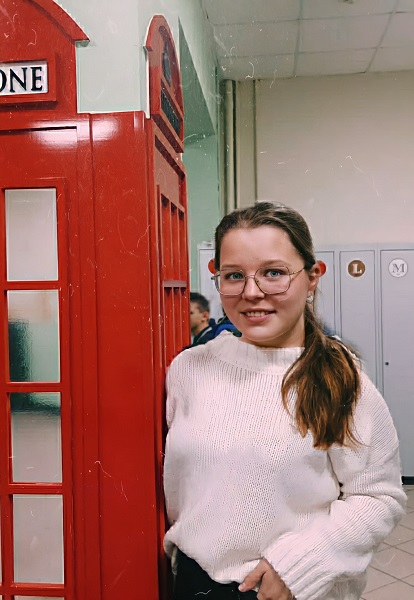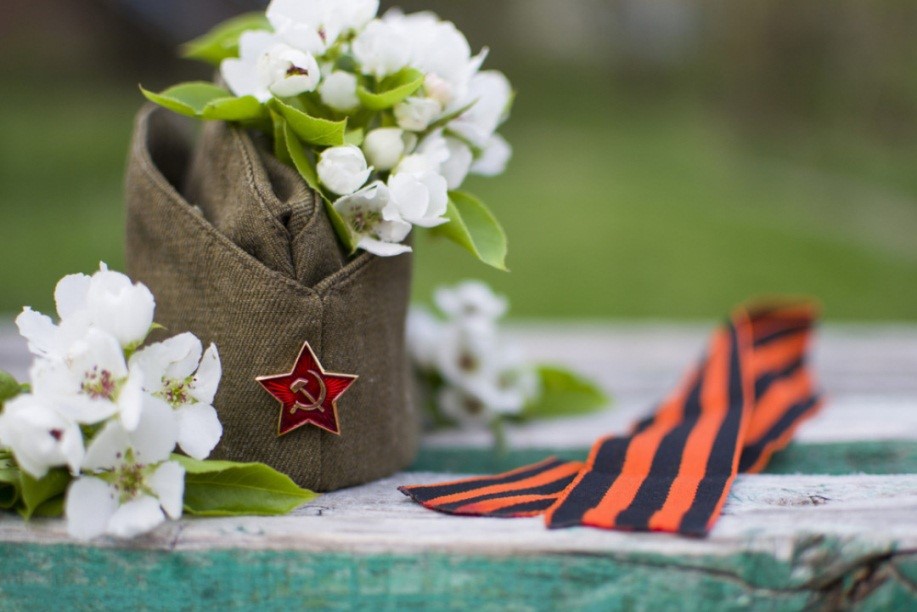Yaroslavl Nekrasov Secondary School № 4 Specialising in English
Composition for the contest
«Remember the Glorious Deeds!»
Karachevtseva Aleksandra
Form 6
Yaroslavl
2020
Composition for the contest «Remember The Glorious Deeds!»
Plan
- Information about the Great Patriotic War.
- Memories of a veteran of the Great Patriotic War.
- Yaroslavl School №4 during the Great Patriotic War.
- Victory Day celebration at School №4.
- Conclusion.
1.
On the 22nd of June 1941 Germany attacked the Soviet Union. The blow was delivered by190 well – armed divisions. The Soviet people began a life-and-death struggle against a strong enemy. The Great Patriotic War began. The slogan «All for the front, all for victory» became the law for the Soviet people.By November 1941 a considerable part of our country had been occupied. Leningrad and Moscow were besieged. And yet the Soviet Army halted the German war-machine first at the walls of Moscow, where the German forces suffered the first crushing defeat which dispersed the myth of their invincibility, then on the banks of the Volga at Stalingrad, where the Nazi block lost nearly 1,5mln men. The name of Stalingrad became a synonym for the Soviet soldiers’ staunchness. The battle on the Volga became the turning point in the war. The Soviet Union lost more than 27 mln lives in that war. Nearly 12 mln were deaths or missing in the action in the Armed Forces. Of course, no country ever suffered losses even approaching these figures in a war. On average, six Russian soldiers died to kill one German. Our soldiers fought for every inch of their soil. For heroism displayed at the front 7 mln people were awarded orders and medals. 11,603 men and women were awarded the title of Hero of the Soviet Union
2.
One of the most difficult battles was the siege of Leningrad. Aleksandra Nikolaevna Vlasova is our family’s friend. She was four and a half years old when the Great Patriot War began. There were four daughters in her family. She had two elder sisters and a younger one. The German army came close to the southern border of Leningrad. 9 divisions were to defend the city. The children and grown – ups stood up to protect their native city – Leningrad. One of them was Aleksandra Nikolaevna`s father, who went to the front on the 13th of September in 1941.
Aleksandra Nikolaevna’s mother had to take care of the four children alone. There was not much food in Leningrad. Everybody in Leningrad always were starving, The soup they cooked often consisted of some grass and water. Every day people got only 125 grams of rye bread. Mothers usually gave their pieces of bread to their children. Even today Aleksandra Nikolaevna remembers how she picked up tiny bread crumbs when she was little. One more thing she remembers very well is round -the-clock air raids began. Their mother had to take her children to the bomb shelter.
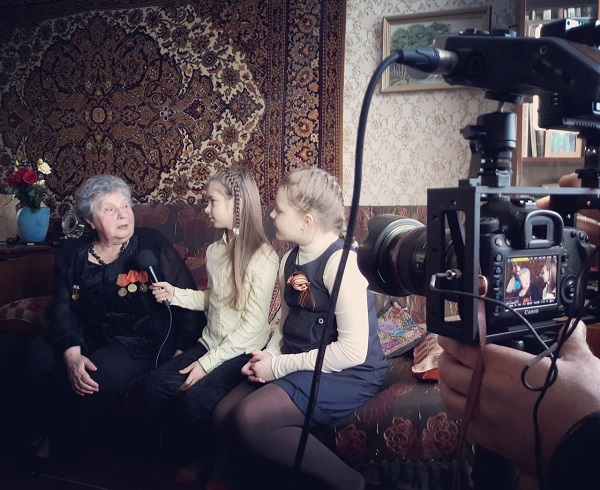 In December 1941 – January 1942 more than 200 thousand residents of Leningrad died. There was not any water and heating because of the fashists’ attacks.
In December 1941 – January 1942 more than 200 thousand residents of Leningrad died. There was not any water and heating because of the fashists’ attacks.
When people went to work, they were so weak that they fell down and could not stand up. They went to bed, fell asleep and didn`t wake up.
Aleksandra Nikolaevna, her sisters and their mother were together till June 1942. One day in 1941 their mother got a letter from the front. She was reading the letter and crying.The letter told her of the death of Aleksandra Nikolaevna’s father. It was a great blow after which their mother fell ill. One morning Aleksandra Nikolaevna woke up and her sisters told her the most terrible news: their mother didn’t wake up that morning. The nurses came, wrapped her in a white sheet, and took her away
The government of Leningrad decided to evacuate children from the city. There was only one way – along the shore of the Ladoga. The evacuation began in March. Aleksandra Nikolaevna and her elder sisters were sent to an orphanage in Yaroslavl and their little sister was sent to another orphanage for little ones. Till today they haу failed to find their little sister and Alexandra Nikolaevna doesn’t know anything about her family.
Even today Aleksandra Nikolaevna lives in Yaroslavl.Even though she had a difficult childhood, her life was long and happy. She has worked at a local factory all her life, and in addition to her work, she has a wonderful family and a wonderful daughter. She often goes to Yaroslavl schools to have meetings with the pupils.
3.
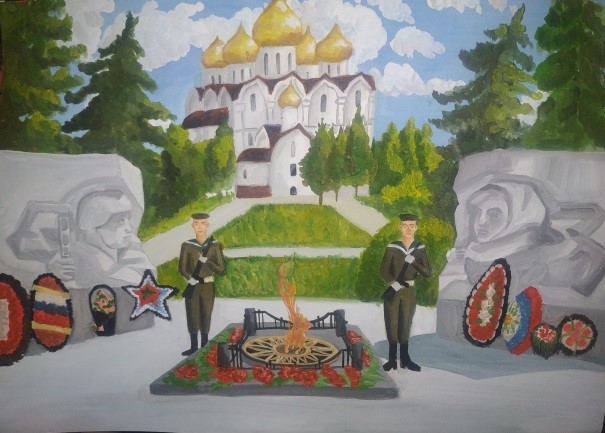 I’m a pupil of Nekrasov Secondary School №4 specialising in English. Ours is one of the oldest schools in Yaroslavl and it has a lot of interesting traditions. Our school was getting ready to celebrate its 5th anniversary in 1941. But this year the former pupils did not come to their native school because many of them went to the front. The teachers of our school also went to the front. Many of them lost their lives defending our Motherland
I’m a pupil of Nekrasov Secondary School №4 specialising in English. Ours is one of the oldest schools in Yaroslavl and it has a lot of interesting traditions. Our school was getting ready to celebrate its 5th anniversary in 1941. But this year the former pupils did not come to their native school because many of them went to the front. The teachers of our school also went to the front. Many of them lost their lives defending our Motherland
During the war the lessons at school were held in 3 shifts. There was not enough light, warmth, text-books and exercise-books. High-school pupils were on duty in hospitals, they built defensive constructions, gathered warm clothes for the soldiers and did many other things to help the front. Only in 1942, the concert group of the Pioneers Palace, which included a lot of pupils from our school, gave their performances for more than 290.000 people.
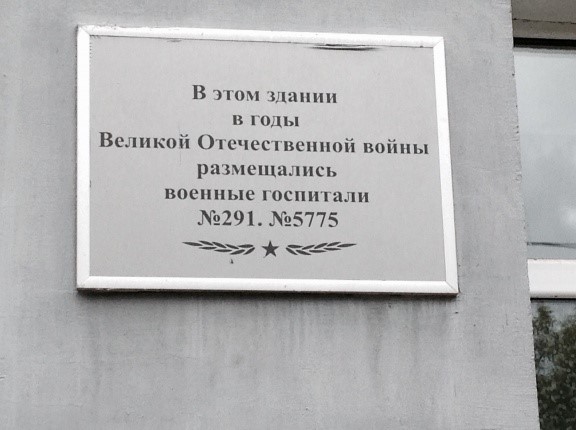 Even today there is a book of orders for the school of those years in the school archive. There are many different orders which have the names of the most active pupils of those days.
Even today there is a book of orders for the school of those years in the school archive. There are many different orders which have the names of the most active pupils of those days.
There is a memory board on the wall of our school. It says that there were two hospitals in the building during the Great Patriotic War. Hospital №291 was here from July 15, 1943 to July 15, 1945. There were 800 beds for the patients who had been wounded at the fronts.. Hospital№5775 was here from April 17, 1943 to October 2, 1945. There were 500 places for the military. The hospital specialized in treatment of tuberculosis, therapeutic and neurological diseases.
4.
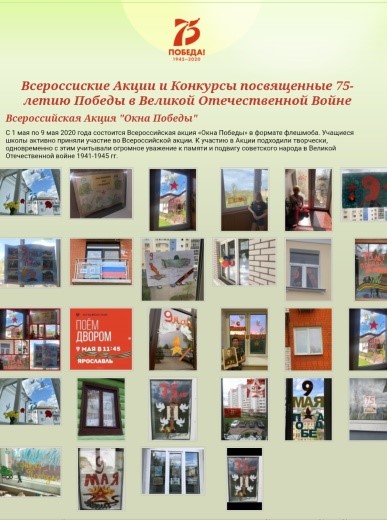 Today the pupils of our school and our teachers do their best to pay tribute to the heroes of the Great Patriotic War who are the former pupils of our school. Each year on the eve of Victory Day all classes of our school go to the Eternal Flame with its symbolic memorial – it looks like a torn photo of a man and a woman who were separated by the war. In memory of the former students who lost their lives at the fronts of the Great Patriotic War there is a Memorial Board in the school. Every year, before the 9th of May, each class brings flowers to the memorial board, and stands in a minute of silence there.
Today the pupils of our school and our teachers do their best to pay tribute to the heroes of the Great Patriotic War who are the former pupils of our school. Each year on the eve of Victory Day all classes of our school go to the Eternal Flame with its symbolic memorial – it looks like a torn photo of a man and a woman who were separated by the war. In memory of the former students who lost their lives at the fronts of the Great Patriotic War there is a Memorial Board in the school. Every year, before the 9th of May, each class brings flowers to the memorial board, and stands in a minute of silence there.
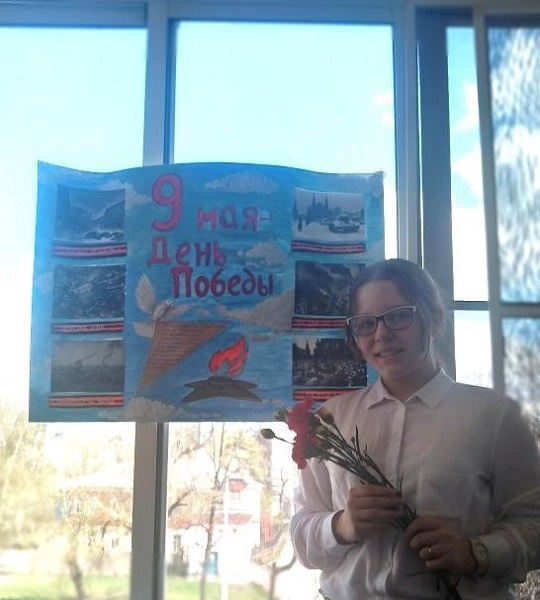 We always have meetings with war veterans. They tell us many interesting facts and stories about the war. Personally, I have tears in my eyes during such meetings. I can't believe the person standing right in front of me could have lived through all this.
We always have meetings with war veterans. They tell us many interesting facts and stories about the war. Personally, I have tears in my eyes during such meetings. I can't believe the person standing right in front of me could have lived through all this.
Different contests and competitions dedicated to Victory Day are held in our school every year. This year which marks the 75th anniversary of our great victory the pupils displayed the photos of their great-grandparents who fought at the fronts of the Great Patriotic War on the school website, they talk about50 them and their deeds with great pride and respect.
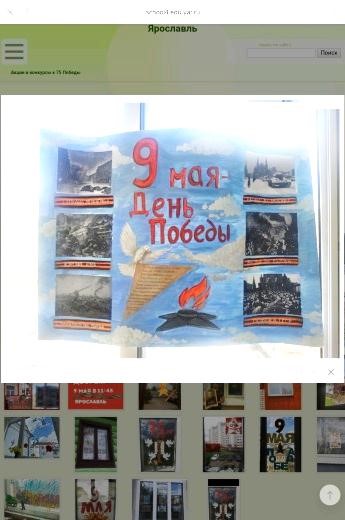 The pupils had to decorate the windows in their houses and flats. Each pupil who took part at the promotion decorated the window in his own way: some of us put stickers on the window, others cut some figures out of paper or drew posters. I took part in this event, too. I drew a poster and placed some photos of the Great Patriotic War. After that I took a picture of my poster and sent it to the organizers of the event. Now the photo is placed on the school website alongside with other pupils’ projects.
The pupils had to decorate the windows in their houses and flats. Each pupil who took part at the promotion decorated the window in his own way: some of us put stickers on the window, others cut some figures out of paper or drew posters. I took part in this event, too. I drew a poster and placed some photos of the Great Patriotic War. After that I took a picture of my poster and sent it to the organizers of the event. Now the photo is placed on the school website alongside with other pupils’ projects.
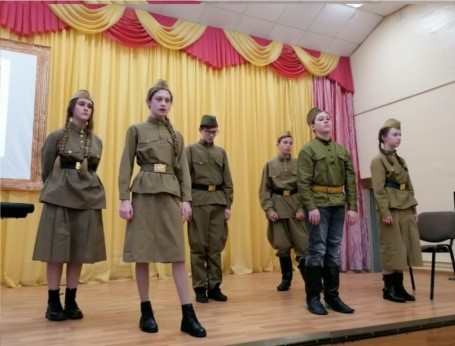 Our school also holds an art festival every year. This year the festival was different from the previous ones. Its theme was devoted to the 75th anniversary of our great victoriy and the festival was entitled «Salute, Victory!» Traditionally there were 3 festival nominations: «Reciters», «Dancers» and «Singers». All the participants tried to select songs or poems or dances related to the war theme. Some participants had tears in their eyes during their performance – they were so moved by the theme. I am absolutely sure that everybody who was watching the performance had the same feelings
Our school also holds an art festival every year. This year the festival was different from the previous ones. Its theme was devoted to the 75th anniversary of our great victoriy and the festival was entitled «Salute, Victory!» Traditionally there were 3 festival nominations: «Reciters», «Dancers» and «Singers». All the participants tried to select songs or poems or dances related to the war theme. Some participants had tears in their eyes during their performance – they were so moved by the theme. I am absolutely sure that everybody who was watching the performance had the same feelings
5.
I’m proud of my school because of its heroic past. I pronounce the words «I am a pupil of Yaroslavl Secondary School №4» with a very special feeling.
There is at least one member in each family in Russia who took part in the Great Patriotic War. Those four terrible years when many people died, when city inhabitants lived in fear of death, explosions, starvation took away tens, hundreds and thousands of lives. During those 4 terrible yearspeople who were dying of hunger, cold, and bombs believed in our victory. They believed in the best, supported each other and managed to achieve their goal. Now we live without war, we have the peaceful sky over our heads and we are happy.for which I am ready to thank my ancestors endlessly!
© Copyright: Exeter Yaroslavl Twinning Association 2014 - 2022
